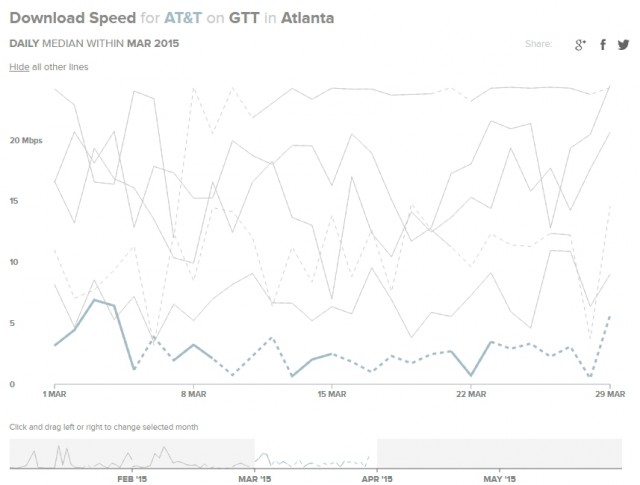 If your YouTube, Netflix, or Amazon Video experience isn’t what it should be, your Internet Service Provider is likely to blame.
If your YouTube, Netflix, or Amazon Video experience isn’t what it should be, your Internet Service Provider is likely to blame.
A consumer group today implicated several major Internet providers including Comcast, AT&T, Time Warner Cable and Verizon in an Internet slowdown scheme that prevented customers from getting the broadband performance they are paying for.
A study* of 300,000 Internet users conducted by Battleforthenet found evidence some of America’s largest providers are not adequately providing connectivity for Content Delivery Networks (CDNs) that supply high-capacity traffic coming from the Internet’s most popular websites.
Significant performance degradation was measured on the networks of the five largest American ISPs, which provide Internet connectivity for 75% of U.S. households.
“For too long, Internet access providers and their lobbyists have characterized Net Neutrality protections as a solution in search of a problem,” Tim Karr from Free Press told the Guardian newspaper, which had advance notice of the study. “Data compiled using the Internet Health Test show us otherwise – that there is widespread and systemic abuse across the network. The irony is that this trove of evidence is becoming public just as many in Congress are trying to strip away the open Internet protections that would prevent such bad behavior.”
 The study revealed network performance issues that would typically be invisible to most broadband customers performing generic speed tests to measure their Internet speed. The Open Technology Institute’s M-Lab devised a more advanced speed test that would compare the performance of high traffic CDNs across several providers. CDNs were created to reduce the distance between a customer and the content provider and balance high traffic loads more evenly to reduce congestion. The shorter the distance a Netflix movie has to cross, for example, the less of a chance network problems will disrupt a customer’s viewing.
The study revealed network performance issues that would typically be invisible to most broadband customers performing generic speed tests to measure their Internet speed. The Open Technology Institute’s M-Lab devised a more advanced speed test that would compare the performance of high traffic CDNs across several providers. CDNs were created to reduce the distance between a customer and the content provider and balance high traffic loads more evenly to reduce congestion. The shorter the distance a Netflix movie has to cross, for example, the less of a chance network problems will disrupt a customer’s viewing.
If technicians controlled the Internet, the story would end there. But it turns out money has gotten between Internet engineers with intentions of moving traffic as efficiently as possible and the executives who want to be paid something extra to carry the traffic their customers want.
That may explain why Comcast can deliver 21.4Mbps median download speeds for traffic distributed by a CDN Tier1 IP network called GTT to customers in Atlanta, while AT&T only managed to squeeze through around 200kbps — one-fifth of 1Mbps. It turns out AT&T’s connection with GTT may be maxed out and AT&T will not upgrade capacity to a network that sends AT&T customers more than twice the traffic it receives from them without direct compensation from GTT.

Internet traffic jam, at least for AT&T customers in Atlanta trying to reach content delivered by GTT.
An AT&T U-verse customer in Atlanta would probably not attribute the poor performance depicted in M-Lab’s performance test directly to AT&T because Internet responsiveness for other websites would likely appear normal. Customers might blame the originating website instead. But M-Lab’s performance results shows the trouble is limited to AT&T, not other providers like Comcast.

AT&T: Slow down, you move too fast.
The issues of performance and peering agreements that provide enough capacity to meet demand are close cousins of Net Neutrality, which is supposed to prevent content producers from being forced to pay for assurances their traffic will reach end users. But that seems to be exactly what AT&T is asking for from GTT.
“It would be unprecedented and unjustified to force AT&T to provide free backbone services to other backbone carriers and edge providers, as Cogent et al seek,” AT&T wrote in response to a request from several CDNs to disallow AT&T’s merger with DirecTV. “Nor is there any basis for requiring AT&T to augment network capacity for free and without any limits. Opponents’ proposals would shift the costs of their services onto all AT&T subscribers, many of whom do not use Opponents’ services, and would harm consumers.”
* – When a copy of the study becomes publicly available, we will supply a link to it.
Correction: It is more accurate to describe GTT as a “Tier1 IP network” which supplies services to CDN’s, among others. More detail on what GTT does can be found here.


 Subscribe
Subscribe
GTT is not a CDN.. GTT is a ISP……
Thanks. I try and de-jargon a lot of this to make things more understandable for average readers. GTT says they are a Tier1 IP Network so I guess we can go with that.
AT&T and GTT are both Tier 1 networks, this is a peering dispute.
Why shouldn’t GTT expand the connection to AT&T at GTT’s expense if the connection is for traffic that GTT is originating? If AT&T was a railroad company, should they have to pay to lay a track to your house and let you ship unlimted amounts of cargo at their expense without charging you anything? Woudn’t the situation be different if you were also a railroad company and AT&T was sending you the same amount of cargo that you were sending them?
Jim, GTT shouldn’t have to pay AT&T to increase the connections for its traffic because YOU already pay AT&T for internet services. Basically, ATT is saying to certain CDNs and other ISPs, “Well, our network is maxed out. So even though our consumers pay us to build a network with enough ports to accept traffic from everyone and make it better all ready, we want money from you or we won’t do it.” And the BS part is that the CDNs especially already pay a ton for the servers and infrastructure that they need to provide the content. They buy… Read more »
Our local power company recently had to string a new higher voltage cable and transformers into our neighborhood to handle increased electricity demand. They didn’t charge Sears to increase supply to run my Kenmore microwave and they didn’t even ask me to pay more. It’s a cost of doing business already folded into my electricity rates. I have a similar attitude about Internet traffic, especially considering the relatively low expense involved in upgrading these kinds of connections and remembering paying customers are directly affected by congestion. If another provider was around to claim they offered better performance, I doubt the… Read more »
Calling people stupid and suggesting they are paid what to think detracts from your points and credibility. If your facts and logic are persuasive, let them stand on their own, without anything to cloud them.